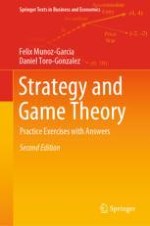2019 | OriginalPaper | Buchkapitel
6. Repeated Games and Correlated Equilibria
verfasst von : Felix Munoz-Garcia, Daniel Toro-Gonzalez
Erschienen in: Strategy and Game Theory
Aktivieren Sie unsere intelligente Suche, um passende Fachinhalte oder Patente zu finden.
Wählen Sie Textabschnitte aus um mit Künstlicher Intelligenz passenden Patente zu finden. powered by
Markieren Sie Textabschnitte, um KI-gestützt weitere passende Inhalte zu finden. powered by
